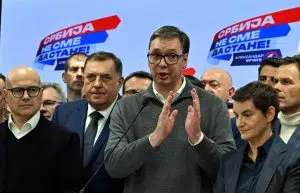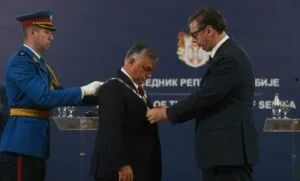Brussels – Following the accusations made by the organized opposition, which was once again defeated at the polls, there are now assessments by international observers, who confirm the same analyses as the press and experts on the ground. The early elections in Serbia on Sunday (Dec. 17), among the most crucial of recent years, were marked by fraud and other wrongdoing that “undermined the electoral process as a whole.” The election process was not a success. This was noted by the election observation mission led by the OSCE (Organisation for Security and Cooperation in Europe), which was also attended by members of the European Parliament: “Observers noted the misuse of public resources, lack of separation between official functions and campaign activities, as well as intimidation and pressure on voters, including cases of vote-buying.”

Of particular concern was the involvement of Serbia’s president, Aleksandar Vučić, who took to the field to push the Serbian Progressive Party (Sns) back to victory in early elections—the third in four years, and without any political or institutional motive that had brought about the end of Ana Brnabić‘s government other than presidential will itself. His “decisive” involvement, according to the head of the OSCE observer mission, Reinhold Lopatka, “dominated” the election process and “the use of his name by one of the candidate lists, together with media bias, contributed to an uneven playing field.”As the preliminary conclusions put it, “the president’s domination of the campaign“—despite the fact that he was not a candidate in Sunday’s election in any capacity—”gave his party an unwarranted advantage.”
Specific allegations that must be contextualized within an “adequate legal framework” and “general respect” for the choice of political alternatives and freedoms of expression and assembly, but at the same time a “highly polarized” environment characterized by “intimidation and harassment of civil activists, human rights defenders and journalists.” Regarding the press, international observers noted that “the diversity of viewpoints has been greatly reduced by the high degree of polarization and the government’s strong influence over most of them”—again with a “domination” and “positive coverage” of President Vučić and his Serbian Progressive Party (of which he was the leader until May)—as well as “numerous reports of critical journalists being verbally insulted by state officials and coordinated attacks by pro-government media.” Also to be considered is the fact that the election campaign took place against the backdrop of the Russian war in Ukraine, a particularly sensitive issue for the relations between Brussels and Belgrade. “Manipulation of information remains a concern, although it was not the predominant theme of the elections,” made clear the EU Parliament’s head of delegation in Serbia, Klemen Grošelj.

This is compounded not only by the fact that the excessive frequency of early elections “undermined trust in democratic institutions” in Serbia, but also by the finding on the ground of “procedural failures, including frequent cases of overcrowding, violations of secrecy of voting, and numerous cases of group voting.” There were about 6.5 million voters registered to participate in the Dec. 17 round of voting, but there were several irregularities at the polls: “We witnessed cases of organized transportation of voters from Republika Srpska [the Serb-majority entity of Bosnia and Herzegovina, ed.] and voter intimidation,” has denounced MEP and member of the parliamentary delegation Viola von Cramon-Taubadel (Greens/Ale), stressing that “we absolutely expected higher democratic standards from an EU candidate country that is negotiating accession.”
This is precisely the major concern in Brussels and beyond. “Serbia has voted, but the OSCE reported abuse of public funds, voter intimidation, and cases of vote-buying; this is unacceptable for a country with EU candidate status,” was the harsh attack that came from the German foreign ministry. More cautious is the European Commission, which in a joint note from the EU High Representative for Foreign Affairs and Security Policy Josep Borrell, and the Commissioner for Neighborhood Policy and Enlargement Olivér Várhelyi, calls for “allegations of irregularities to be followed up in a transparent manner by the competent national authorities.” In today’s (Dec. 19) daily point with the European press, the spokesperson-chief of the EU executive, Eric Mamer, reminded that “we have a clear negotiating framework with Serbia, which also covers democracy and electoral processes as a key issue.”
The result of early elections in Serbia
Despite high expectations on the eve of the elections from the “Serbia Against Violence” coalition, the Serbian Progressive Party won again in the snap elections with 46.67 percent of the votes, edging out by 23 percentage points the very united opposition that came in second place (while the coalition led by socialist Ivica Dačić collapsed to 6.56, in third place). In the new parliament, the Sns is expected to control 128 seats out of 250, with the possibility thus of governing without allies. In the face of the fraud and numerous illegal actions at the ballot box, thousands of people took to the streets to protest against the results after an appeal by parties and movements ranging from the center to left-wing environmentalism: the coalition had been formed precisely after the translation into (pro-European) political instances of the anti-climate street protests that led to the May Shootout, and today it does not seem to want to let up against the ruling party’s fraud. “They stole our future,” read the signs of protesters in front of the Serbian Election Commission building in Belgrade last night.

It is precisely in the capital that the situation is particularly tense, since the Serbian Progressive Party has claimed victory in the most hotly contested municipal election in the country: the party led in Belgrade by the pro-Russian Aleksandar Šapić reportedly won 49 seats (out of 110), which, however, would not be enough to control the City Assembly alone with the support of the far-right Russophile nationalist party “We, Voice of the People” of Branimir Nestorović (6 seats). The “Serbia Against Violence” coalition (42 seats) complained that over 40 thousand people who arrived from Republika Srpska voted in Belgrade without being formally registered as residents and called for the annulment of the ballot result, explicitly speaking of “electoral theft”. From Moscow, Serbian President Vučić and the Sns were congratulated yesterday by Kremlin spokesman Dmitry Peskov, who spoke of “further strengthening of friendship” between Russia and Serbia. Closing out the “Russian triangle” was not missing Belgrade’s closest ally (and increasingly overtly also of Russian autocrat Putin), Hungarian Prime Minister Viktor Orbán, who has defined the one of Vučić and his party “an overwhelming electoral victory.”
Find more insights on the Balkan region in the newsletter BarBalcani hosted by Eunews
English version by the Translation Service of Withub




